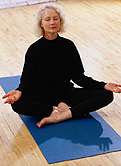(HealthDay)—Yoga may improve menopause-related quality of life (QOL) in women with vasomotor symptoms, according to research published in the March issue of the American Journal of Obstetrics & Gynecology.
Susan D. Reed, M.D., M.P.H., of the University of Washington in Seattle, and colleagues conducted a randomized, controlled, factorial design trial comparing the effects of yoga (107 participants), exercise (106), or usual activity (142), as well as omega-3 capsules (177) or placebo (178), on QOL in perimenopausal and postmenopausal women (average age, 54.7 years). Outcomes were assessed with total score for menopausal QOL and scores for each domain (physical, psychosocial, sexual, and vasomotor symptoms).
The researchers found that, at 12 weeks, the yoga group, compared with the usual activity group, had improved scores for total menopausal QOL (between-group difference, −0.3; 95 percent confidence interval, −0.6 to 0; P = 0.02), vasomotor symptoms domain (P = 0.02), and sexuality domain (P = 0.03). No improvement in the total score for menopausal QOL was observed for women assigned to exercise and omega-3 capsules. Women assigned to exercise had improved scores for the physical domain (P = 0.02) at 12 weeks.
"We found that, among healthy sedentary menopausal women, yoga appears to improve menopausal quality of life; the clinical significance of our finding is uncertain because of the modest effect," the authors write.
The omega-3 supplement and matching placebo used in the study were donated by Nordic Naturals. Several authors disclosed financial ties to the pharmaceutical industry.
More information:
Abstract
Full Text (subscription or payment may be required)
Journal information: American Journal of Obstetrics and Gynecology
Copyright © 2014 HealthDay. All rights reserved.



















